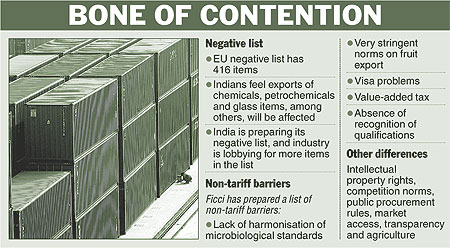Free trade talks with EU lose pace
The Telegraph | 16 March 2008
Free trade talks with EU lose pace
R. SURYAMURTHY

New Delhi, March 16 : India and the European Union (EU) will have to give the December deadline for their free trade agreement a miss if differences persist over the negative list and non-tariff barriers to trade.
A ministerial meeting is scheduled next month where the two will exchange their respective negative lists and try to thrash out their differences.
However, sources said, there is not enough time, and it is unlikely that the December deadline to finalise the terms of the agreement will be met. There are differences of opinion between the parties over intellectual property rights, competition, agriculture, public procurement, market access and transparency.
India wants better access for its services, while the EU desires the same for its goods.
Officials, however, said the agreement would not be affected because of agriculture, since the EU does not export bulk farm commodities such as rice and wheat, on which Indian farmers primarily depend. The EU exports only value-added agricultural products, they said.
It has already handed over its initial negative list covering 416 items to India. The items are listed under the categories of chemicals, plastics, rubber, textiles, raw hides, precious stones and metals, computers, electrical machinery and some classes of vehicles. India is in the process of submitting its negative list.
Items on the negative list are subject to high tariffs.
Sources in Indian industry said the EU’s negative list would affect exports of many products such as basic chemicals, petrochemicals, allied chemical products, cosmetics, plastics, ceramics, glassware items, fertilisers and pharmaceuticals. India and the EU had earlier agreed to include at least 90 per cent of traded products in the bilateral agreement. This percentage may get reduced now.
The finalisation of India’s negative list is being delayed by demand from industry to include more products. Even segments of industry that face no direct competition from the EU want their products to be on the list.
A study by the Federation of Indian Chambers of Commerce and Industry (Ficci) has noted the concerns of Indian business vis-à-vis trade with the EU.
Some of the barriers to trade and investment are a lack of harmonisation of microbiological standards in the European countries, tough fruit export norms, aflatoxin limits in groundnuts, visa issues, a lack of recognition of qualifications and work experience and value-added tax.
Commerce minister Kamal Nath is unhappy over the slow pace of the negotiations. He said India wanted to conclude the negotiations by 2008, so that the agreement was in place by 2009. The value of India’s trade with the EU can touch $572 billion if the agreement is fully implemented by 2015, the Ficci study said.
There is concern over India’s growing trade deficit with the EU. The deficit rose to $3 billion in 2006-07 from $492 million in 2001-02.
The latest economic survey said there was a need to evolve a clear policy for comprehensive economic cooperation agreements with some developed countries.
Instead of just signing trade agreements, policy-makers should prepare pacts that were integrated with the country’s economic and trade policy reforms, the survey said.
It said the country should seriously consider “making real gains” in global trade talks under the World Trade Organisation while protecting the livelihoods of the poor.
“While safeguarding the interest of India’s low income and resource-poor agricultural producers (which cannot be a trade-off against any gains elsewhere in the negotiations) remains paramount for India, making real gains in services negotiations are no less important,” the survey said.





